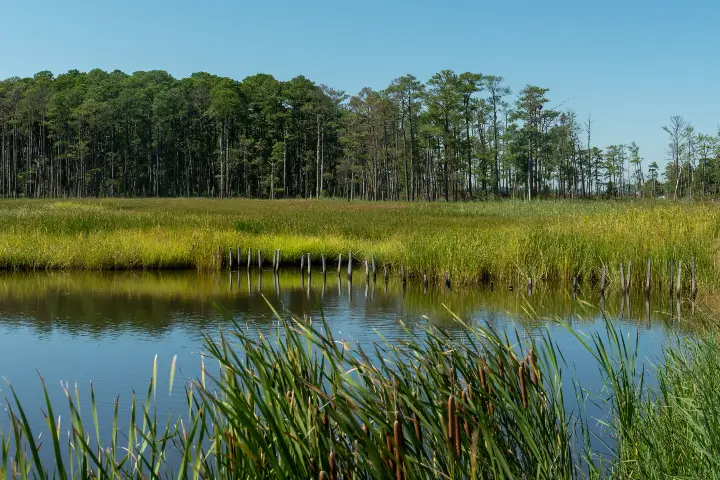
Are you ever sitting in your backyard enjoying a nice summer’s day when you hear a buzzing in your ear, or you feel an itch? You slap the mosquito, but just miss as it flies off. “Ugh, do you even have a purpose other than annoying me?” It turns out, yes, mosquitoes do have an important role in the ecosystem. They’re an important part of the food chain for many animals, and they serve as pollinators for plants.
Keep reading to learn more about mosquitoes’ surprising role in the ecosystem, brought to you by the mosquito control experts at Lookout Pest Control.
What’s the Purpose of Mosquitoes?
Mosquitoes are considered biological control agents, meaning they help keep insect populations under control. Mosquitoes also pollinate flowers and serve as a food source for larger animals such as birds. Mosquito larvae are food for fish, frogs, dragonfly nymphs, and birds that feed on water insects.
Adult mosquitoes are eaten by bats, birds, spiders, dragonflies, and other insect-eating organisms. They also eat the nectar of flowers and fruits such as mangoes. Mosquito larvae have a symbiotic relationship with some small crustaceans, such as copepods. During the larval stage of the mosquito, the copepods live within the larva until it emerges from the pupal stage into adulthood when the copepods leave to find another host.
Need a Mosquito Control Estimate?
Click below to leave your information and we will call you right back!
Get your free estimate today!
Leave your information below and we will give you a call back.
After-hours inquiries will be returned the next business day.
Why Do Mosquitoes Bite You?
Did you know that not all mosquitoes are out to bite you? Only the females bite, and only when they’re ready to breed. That’s right: mosquitoes mostly feed on plant matter. Blood only comprises a small and very specific part of their diet.
Differences Between Male and Female Mosquitoes
- Only female mosquitoes bite humans, and a mosquito can ingest up to three times its weight in blood.
- Male mosquitoes only feed on plants. The adult female mosquito feeds on plants also, however, she also needs blood to reproduce. Female mosquitoes must feed on blood to lay their eggs.
- Female mosquitoes are equipped with specialized mouthparts that enable them to penetrate the skin, inject an anticoagulant, and then suck out the blood of their victims.
- Female mosquitoes are larger than males on average.
The Mosquito Lifecycle
The mosquito life cycle consists of four stages: egg, larvae, pupa, and adult.
- Eggs: Adult female mosquitoes lay eggs in standing water. The eggs usually hatch within a matter of days if the conditions are right.
- Larvae: If you see small worm-like things wriggling in standing water, these are most likely mosquito larvae. You can dump out the water in a dry area and it will most likely kill the “wriggles”.
- Pupae: These appear larger and more developed than “wriggles” but still live in standing water. You often find them floating near the top of the water. You can still dump out or dry up the water at this stage to eliminate them.
- Adults: At this point, they fly off to begin the life cycle anew. Mosquitoes are most active at dawn, twilight, and nighttime, and only live for around two weeks. However, they can live longer if they have a good food and water supply.
How Many Kinds of Mosquitoes Are There?
Approximately 3,500 mosquito species can be found in the world. Of these, 175 species have been discovered in the United States. Not all mosquito species bite humans, and only a couple hundred of them feed on human blood.
Schedule Mosquito Control Today
Yes, mosquitoes play a crucial role in the ecosystem, both as predator and prey. The fact is mosquitoes can be deadly at the worst, and at best – an extreme nuisance. Lookout Pest Control’s mosquito control services can help protect you.
Lookout Pest Control offers mosquito control services throughout the Southeast. Call us today for a free estimate on treatment for your home or business!
Back to Mosquito ControlDo Mosquitoes Have A Purpose To The Ecosystem in Tennessee, Georgia, Alabama, Kentucky, North Carolina, & South Carolina?
Serving the Southeastern United States
Tennessee | Chattanooga Metro | Nashville Metro | Knoxville Metro
| Georgia | Atlanta Metro |
Alabama | Huntsville Metro | Birmingham Metro
Kentucky | Bowling Green Metro | Hopkinsville | Russellville
| North Carolina | Charlotte Metro |
South Carolina | Charleston Metro
Home » Mosquito Control » Do Mosquitoes Have A Purpose To The Ecosystem?
